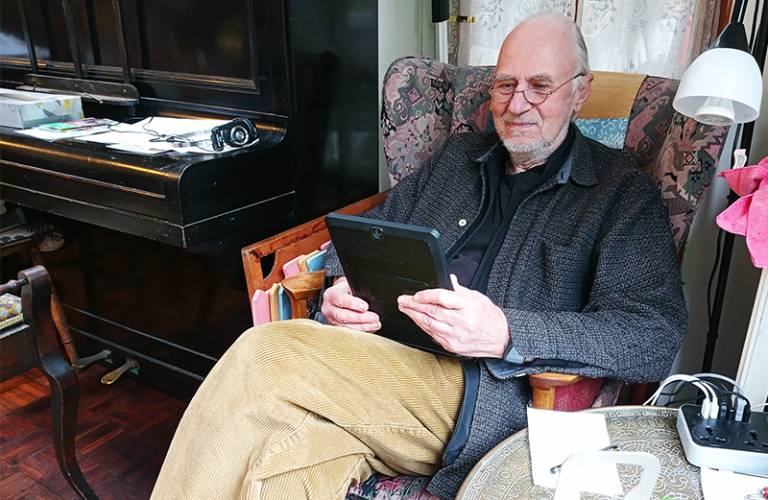Research on video calls and hearing loss
30 November 2020
During the COVID-19 pandemic, there has been a huge increase in the use of video calls as a way to stay connected with others and improve wellbeing.

Staying connected is especially important for people aged 70 and above who have been advised to self-isolate for long periods of time. However, there may be barriers to video call use, including difficulties with hearing. We are interested in finding out how and to what extent older people with hearing loss have been using video calls, focusing on ease or difficulty of use and any effects on feelings of loneliness and isolation.
Take part in our survey
We’ve launched a survey to find out about these things and we’d love you to take part, whether you use video calls frequently or hardly at all and whether you love them or loathe them (or something in between). You can complete the survey online or, if you prefer, fill in a paper copy. It should take roughly half an hour. We will also conduct a smaller number of in-depth interviews to find out more detail about people’s experiences; you can volunteer for an interview via the survey.
If you’re interested, please register here. If you’d like any more information, please email ear.vcp@ucl.ac.uk or phone 02076798904. If you prefer to fill in the survey on paper, we can send you a copy in the post. All respondents can choose to be entered into a prize draw to win one of two £50 shopping vouchers.
This project is a collaboration between four different UCL departments: the Ear Institute, Centre for Behaviour Change, Division of Psychiatry and Institute of Health Informatics. We will use the results of our investigations to write recommendations about making video conferencing more accessible to older people with hearing loss. We believe that the information we gather will be valuable in helping older people with hearing loss cope with further periods of isolation, either due to the pandemic or other life events.
The project is led by:
- Dr Lucy Handscomb (principal researcher). UCL Ear Institute, L.handscomb@ucl.ac.uk
- Dr Hannah Cooper, UCL Ear Institute,, Hannah.cooper@ucl.ac.uk
- Dr Carly Meyer, UCL Institute of Clinical, Education and Health Psychology, carly.meyer@ucl.ac.uk
- Dr Becky Gould, UCL Division of Psychiatry, r.gould@ucl.ac.uk
- Prof Henry Potts, UCL Institute of Health Informatics. H.potts@ucl.ac.uk
Funded by UCL Institute of Mental Health and approved by UCL research ethics committee ID: 3115/006
 Close
Close

